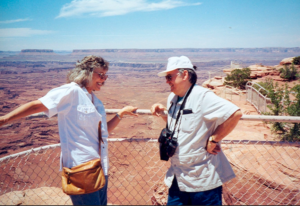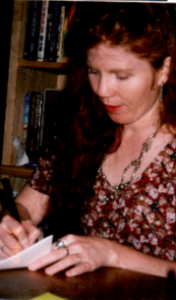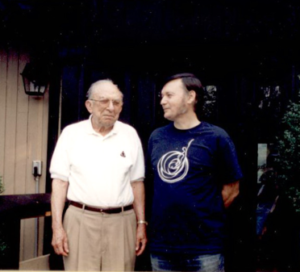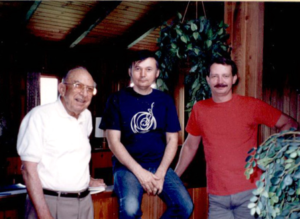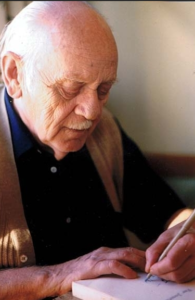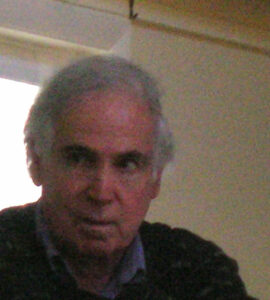
Jim Szpajcher took this nice photo in October, 2006
Rita’s husband Martin died on Friday, April 7, 2000, a few days after an accident in his car, after having asked to be taken off life-support. A few hours later, I sat down with my journal, thinking to talk to the guys upstairs, and instead this is what came out:
“Frank, this is Martin. Tell Rita thanks and remind her that over here we have no time – so the slight delay in decoupling from the body doesn’t have any significance. I will be seen and heard for a little while, tell her, so don’t be surprised and don’t be surprised at what she hears from others. Tell Leslie [Rita’s daughter] that the timing was good as always. She’ll know what I mean by the ‘as always.’”
Now, this was cryptic, except for the part about Rita experiencing him for a while, and if Rita or anybody ever told me what it meant, I have forgotten. It was the second paragraph that changed things:
“Don’t tell her, but take care of Rita. I know you will want to. It won’t be all that long, as you already know.”
Then he was gone and I asked the guys if that was really Martin.
“Did it feel like his presence?
“Yes it did. Quite strongly there, for a moment. But who ever knows what we self-suggest.
“Don’t worry about it. You know the saying, you inhibit what you doubt. You aren’t a true believer, so don’t worry so much about deceiving yourself.”
Well, if you had received such a message, would you write it off as one of those things, or would you listen? Martin asked me to take care of Rita. I took that to mean, give her some attention. So I got us into the habit of having supper together every Saturday night. (Always at the Lovingston Café, almost the only restaurant she ever frequented, as far as I know, Charlottesville being twice as far from her home on the New Land.)
I thought I was doing it out of the kindness of my heart, but as usual, kindness paid unexpected dividends. You can’t go out to eat with someone every week, for months, without moving your relationship to a deeper level. You will share stories, and experiences, and jokes, and (if only between the lines) values and hopes deferred and hopes not yet abandoned. And all the time you are doing that, you will be building up an understanding and a trust between you, and trust is always the sine qua non. Without trust, any relationship can go only so far.
Neither Rita nor I had any idea, at least, not on the conscious level, that we were being brought together to accomplish something. We were enjoying each other’s company.
She was one more example of benign, nurturing, maternal energy that I seemed to need. (She was only five years younger than my parents.) yet she was also a rigorous intellect, a trained academic, an experienced Monroe participant, an inquiring mind with a long list of questions she had not been able to get the answer to.
Just what she saw in me, I don’t know, of course. Sincerity, openness, curiosity, intelligence, no doubt. Kindness. And perhaps I was a window into other worlds: journalism, business, politics on the practical level, even perhaps merely the world-view of someone her children’s age.
In any case, we interested each other, and we enjoyed each other’s company, and in the months between April and September, we entered a relationship of mutual trust and affection. Then I took a step that led to so much more. I signed up for ten sessions in TMI’s black box.
Beginning in September, I spent every Friday morning in the isolation chamber, with Skip Atwater as monitor. He and I would discus my goals beforehand, and would debrief the session afterward, and during the session itself he, sitting in the control booth, would watch the instruments and vary the Hemi-Sync frequencies being delivered to my earphones, and would sometimes offer input, and would answer whatever questions or concerns that would arise.
When I returned home with the cassette tape of the session, I would spend time – a lot of time! – transcribing it, and then would send that transcript to a short list of friends, of whom Rita was one. She and I would discuss those sessions the following night, Saturday, over supper in Lovingston. (I later self-published those transcripts as A Place to Stand.)
Fast forward to August, 2001. Rita had gotten me another session in the black box as a birthday present, and when I said I wished I could do sessions on a continuing basis, she said I didn’t need the box, and so we set up a schedule. Tuesday nights after I had supper, I would drive up to Rita’s house, only a couple of miles away. I would lie down on the bed in the guest room, with my head toward the center of the room. She would sit nearby with her pad of questions and the tape recorders, and we would do just what I did for ten weeks at the end of the previous year. And I would take my tape home and transcribe….
We did that for 22 weeks in a row, and those sessions became The Sphere and the Hologram.
Now, bear in mind, Rita is the one who originally designed TMI’s protocols for PREP sessions. For the lab’s first four years, she and Martin had functioned as monitors. She had a huge backlog of questions she had never been able to get answered. She would ask them of participants who had run through their own questions, and would get only frustratingly vague non-answers. “Oh, it’s hard to explain.” “Everything is fine.” “You’ll know when you get here,” etc.
But from me, for some reason, she could get fluent answers, and the more complicated or arcane the question, the better it got. At one point I said to her, “Rita, you’re asking me these questions, and you’re getting these answers, but I don’t know any of this stuff. I feel like I’m lying here just being a know-it-all.” She paused and then said, “That’s practically the definition of an intuitive.”
So Rita’s part of my story is that she brought me from exploring experiences to actually bringing forth information. She did that partly by building on the trust between us. (Trust removes that inhibition that comes from doubt as to how material will be received.) But Skip had done the same thing. Equally important in Rita’s case was her long backlog of specific unanswered questions, and the academic training that led her to question closely the material as it arrived. Thus she would say, “But this seems to contradict what you said three sessions ago,” and the guys would pause and say the could see why it might look that way, and then explain both the previous and the present statements. They more than once said, “The better the questions, the better the answers,” and her questions were first-rate.
Rita died March 19, 2008, and I had a dream that told me she was fine, and I thought that was the end of the story. Not quite!

